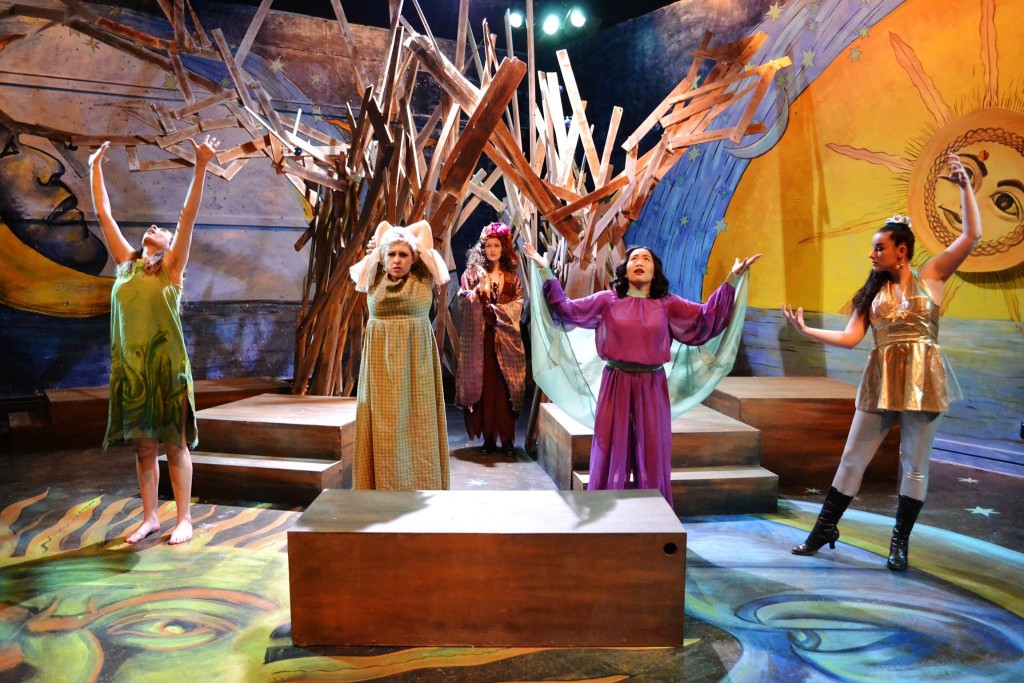
‘Out of the Garden’ play review
By Caroline Ho, Arts Editor
Humans throughout history have been imposing rules, defying expectations, and discovering what pleasure is. Out of the Garden, the latest production by Douglas College’s Departments of Theatre and Stagecraft & Technology, captures this spirit of revelation across the ages. Framed by the mysterious Madame Blavatsky’s Tarot card readings, the show wholly lives up to its subtitle of “A Short History of Sexuality.”
The play jumps back and forth between four stories stretching across time and culture, all with very distinct settings and moods, though does so with fluid scene transitions. Although the post-Protestant Reformation Vinegar Tom story has the most stage time and the largest cast, it doesn’t feel like the focal point of the play—or at least, no more than the other three also feel like they carry the main theme of the show. All four of the stories are brilliantly acted and equally gripping.

Chronologically, the first tale is about Eve (Allegra Ferrari), recounting her time in and her exile from the Garden of Eden. Although Eve’s narrative might seem like the one that we all know—she’s tempted by the snake, she eats the apple, she and Adam are kicked out of the garden—hearing her work through and justify her choice feels entirely original. Eve is curious, confused, indignant, and sympathetic; in the intimate setting of the Studio Theatre, Eve speaks personally to each and every one of us, making us question the arbitrariness of rules and the wrongness of pleasure.

These questions are equally present in the rich world of Vinegar Tom, set in 17th-century rural England where belief in God’s power—in His direct hand in daily life—is the cornerstone of reality. Within this God-fearing framework, a group of villagers grapple with the threats of witchcraft, persecution, and rigid societal structures. Strict and repressive as this world is, the actors convey an immense depth of emotion: From the passion and unyieldingness of norms-defying Alice (Dahlia Kerr) and her mother Joan (Nina Dosdall), to the simple piety of Susan (Kate Rytter), to the zealous conviction of witch-hating farmers Jack (Peter Tran) and Margery (Ferrari) and witchfinders Packer (Michael Jenkins) and Goody (Madison Green). The Vinegar Tom world is a sobering window into this severe environment, where women who did not conform had to face the consequences—whether in divine punishment or societal condemnation. This story has some humorous moments, but most of the scenes are intensely emotional, driven by the fear of God or by rage against oppression.

Most of the humour (and plenty of the passion) in Out of the Garden is in Anima Mundi, especially in the character of fortune-telling, Tarot-reading, séance-holding Madame Blavatsky (Piper MacLeod). This storyline takes place in London around the turn of the twentieth century, focusing on the not-quite-courtship between budding American poet David Armitage (Nicholas James) and wilful young dancer Elizabeth (Hilani Baybay). Also featured in this world are the poets William Yeats (Jenkins) and Ezra Pound (Tran). Poetry, art, and the whims of fortune—Anima Mundi means “soul of the world,” and the lyrical spirit of this age is touchingly invoked in these scenes.
Most modern—and certainly not least relevant or moving—is the monologue of Meredith (Green), a woman who is completely, unapologetically obsessed with the story of Frankenstein. Her fervent fixation with every iteration of the Frankenstein story, from movies to novels to comics, beautifully encapsulates the disillusionment with modern life, with gender norms and expectations, and with the limitations of reality. Her monologue circles back seamlessly to the creation of life in the story of Eve.
It’s impossible to single out any of these four stories as the best, because they are so cleverly tied together. By the end of the play, the thematic threads are brought to an intimate and impeccable convergence. And for interested would-be audiences, there’s still time to catch this exquisite emotional journey: Out of the Garden runs until Friday, March 17.


